On December 6, 2019, the Shanghai Jiaotong University Kobe University Joint Forum and the Second "Innovation and Co creation" Sino Japanese Enterprise Innovation Cooperation Forum were held in Liao Kaiyuan Law Building, Xuhui Campus, Shanghai Jiaotong University. With the theme of "medical health industry and social system innovation in an aging society", this forum was co sponsored by Shanghai Jiaotong University, Kobe University and the Consulate General of Japan in Shanghai, and won the honors of the Chinese Academy of Medical Sciences, Shanghai Welfare Center, Shanghai Elderly Care Service Industry Association, Kobe Municipal Government, Shanghai Japan Business Club, Japan Trade Promotion Agency (JETRO) Shanghai Representative Office Japan China Economic Association Shanghai Office's strong support.
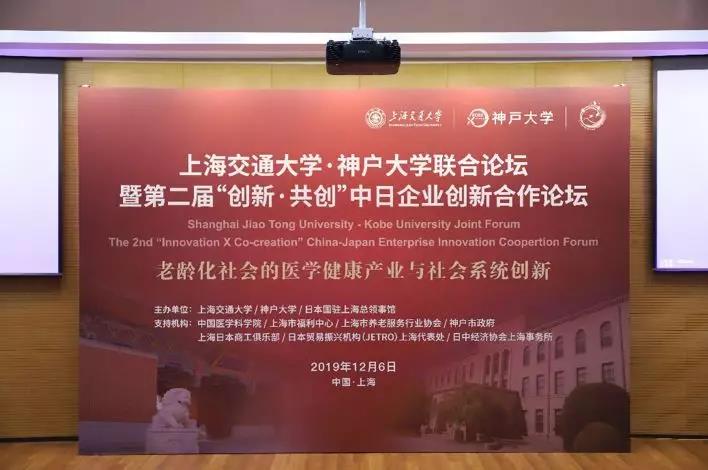
On the occasion of Prime Minister Shinzo Abe's visit to China in October 2018, the leaders of both sides reached a consensus on promoting dialogue and exchanges on innovation and intellectual property between the two countries. In this context, the Japan Research Center of Shanghai Jiao Tong University and the Consulate General of Japan in Shanghai jointly established the Sino Japanese Enterprise Innovation Cooperation Forum, which is planned to be held regularly in Shanghai. The forum aims to promote in-depth dialogue and exchanges between China and Japan's innovative emerging enterprises, experts in related fields and government functional departments, and jointly promote mutual exchanges and learning between China and Japan's enterprises. The first forum was successfully held in Xuhui Campus of Shanghai Jiaotong University on March 16, 2019.
The opening ceremony of the forum was hosted by Ji Weidong, director of the Japan Research Center of Shanghai Jiaotong University. Xu Xuemin, Vice President of Shanghai Jiaotong University, Takeda, President of Kobe University, and Akio Yoshimata, Consul General of Japan in Shanghai delivered speeches respectively.
Xu Xuemin, Vice President of Shanghai Jiao Tong University, introduced the basic situation of the Japan Research Center of Shanghai Jiao Tong University and the Sino Japanese Enterprise Innovation Cooperation Forum, and earnestly expected that this forum would play a better role as a cooperation and exchange platform in the medical and health industry and elderly care service industry in an aging society.
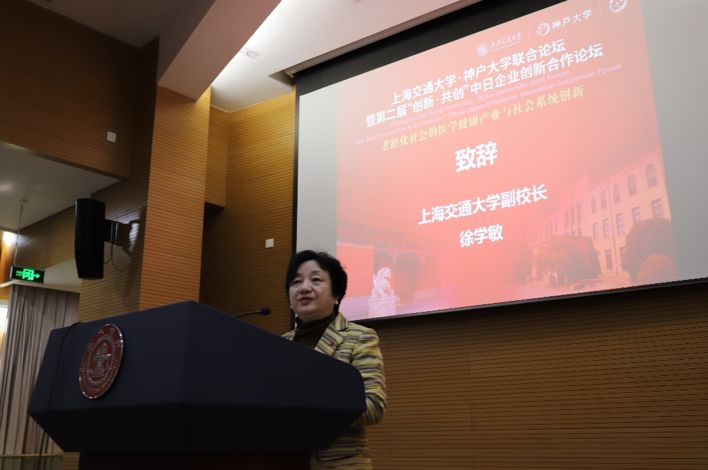
Speech by Xu Xuemin, Vice President of Shanghai Jiaotong University
Kobe University President Hiroshi Takeda introduced the history of long-term exchanges and cooperation between Kobe University and Shanghai Jiao Tong University, and hoped that this forum could provide important wisdom and suggestions for China and Japan to cooperate in dealing with an aging society.
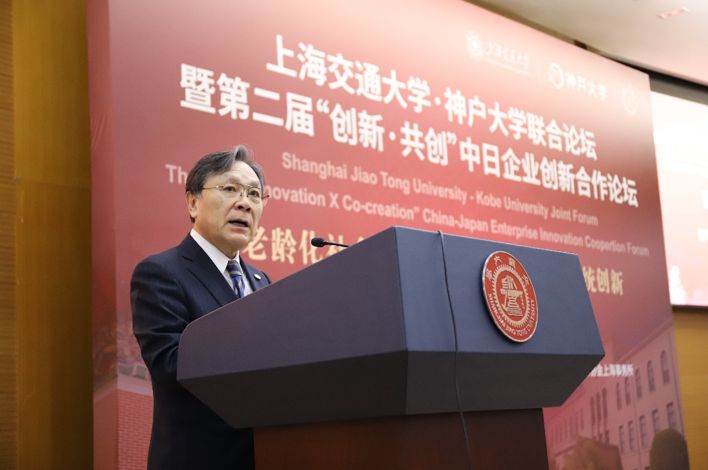
Speech by Kobe University President Takeda Hiroshi
The Consul General of Japan in Shanghai, Akio Yoshimata, pointed out that in recent years, China and Japan have increasingly strengthened interaction in health medicine, elderly care and other industries. He believed that this forum would provide a development opportunity to enhance further cooperation between experts, scholars and entrepreneurs of the two countries in related fields.
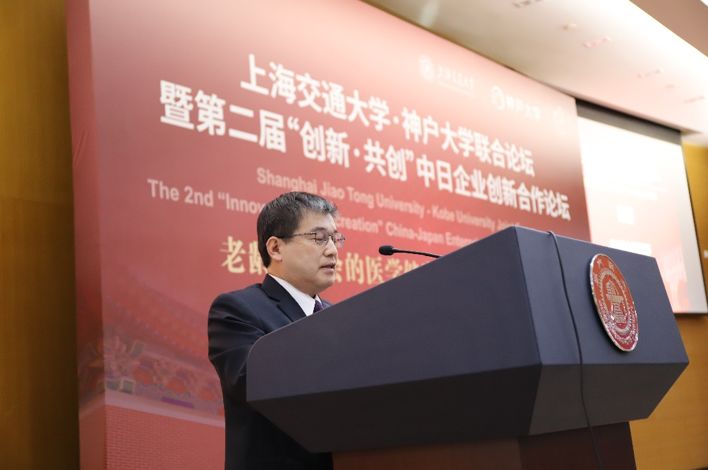
Speech by Akio Jimata, Consul General of Japan in Shanghai
Subsequently, the forum entered the keynote speech segment, with Professor Ji Weidong as the moderator. Li Qing, Vice President of the Chinese Academy of Medical Sciences, Gang Fengshu, Secretary General of the Japan China Investment Promotion Agency, Director of Mizuho Bank, Ltd., Xu Qihua, Director of Shanghai Welfare Center, President of the Elderly Care Industry Association, Gu Hejiupeng, Professor of Health Research in Kobe University Graduate School, Zhang Xiaoyi, Professor of the School of International and Public Affairs of Shanghai Jiaotong University, and Director of the Institute of Long term Care for the Elderly, respectively made keynote speeches on their research fields.
Li Qing, Vice President of the Chinese Academy of Medical Sciences, introduced the development status of China's health industry and proposed opportunities for China Japan cooperation in the new era. He pointed out that in the context of the healthy China strategy, China's health related industries have grown significantly faster than other industries in recent years. Their rapid development is inseparable from China's economic development and the Chinese government's strong investment in the health industry. The sustainable development of China's health industry benefits from the continuous improvement of relevant policies. He believes that in the new era, China and Japan will conduct exchanges from new drug research and development, precision medicine, regenerative medicine, medical devices, as well as elderly care and hospice care to promote further cooperation through talent exchange, research and development cooperation, industrial cooperation, investment cooperation and other ways.
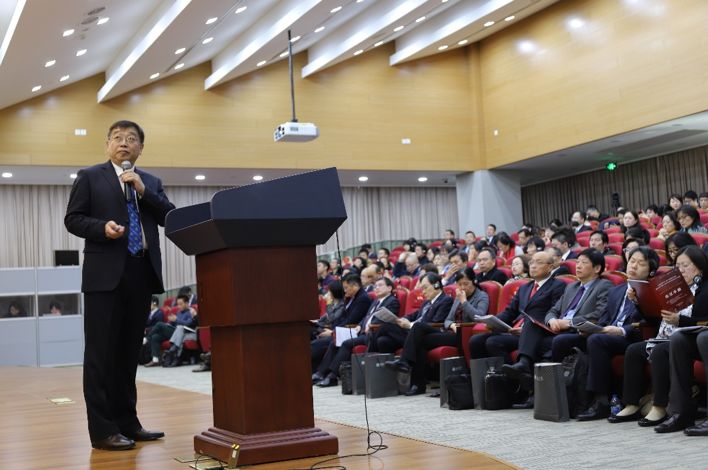
Speech by Li Qing, Vice President of the Chinese Academy of Medical Sciences
The Secretary General of Japan China Investment Promotion Agency, and the Director of Mizuho Bank, Ltd., Feng Shu Oka, analyzed and predicted the current situation and future of the aging social medical industry. He pointed out that aging is a common problem facing the whole of Asia and should be addressed in terms of the employment, education, medical care and social security of nursing staff. He envisaged that the society in 2050 should be an ideal social state of fairness, justice, wealth, sustainable development, advocating the realization of personal value, and anyone can live safely. Integrating the medical foundation, realizing the high industrialization of medical care, and promoting the improvement of medical finance and market creation will be the three steps to achieve the ideal state in 2050.
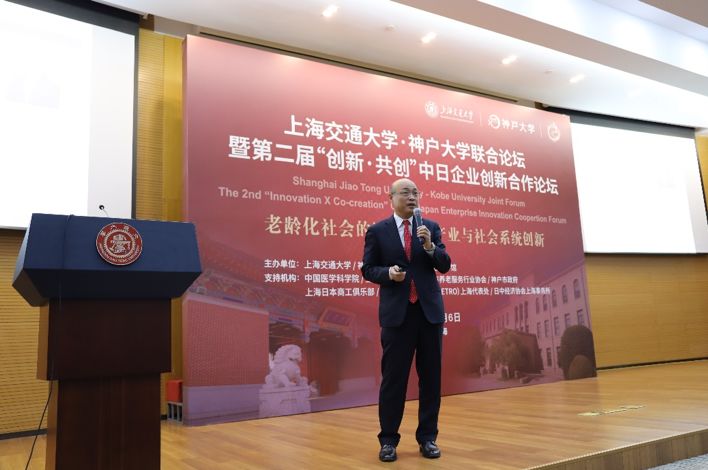
Speech by Feng Shu Oka, Secretary General of Japan China Investment Promotion Agency and Director of Mizuho Bank, Ltd
Xu Qihua, director of Shanghai Welfare Center and president of the Elderly Care Service Industry Association, introduced the current situation and trend of the development of the elderly care service industry in Shanghai. He pointed out that since ancient times, China has been providing for the aged at home, and only after entering the 21st century has it gradually begun to pay attention to social elderly care. The pattern of China's elderly care model is changing from a single pattern to a composite pattern, from a traditional service industry to a high-tech first evolution industry, and from a local elderly care to a trans regional elderly care. Looking forward to the future development trend of the elderly care service industry in Shanghai, he believes that it can be summarized as "three increases" and "eight focuses". "three increases" refer to increment, energy increase and efficiency increase. "eight focuses" include focusing on integrated development, focusing on the basic role of the market in resource allocation, focusing on balanced development between urban and rural areas, focusing on the application of modern information technology and artificial intelligence in the development of the elderly care service industry Pay attention to the basic role of long-term care insurance as an institutionalized guarantee in promoting the elderly care service industry, pay attention to the training and introduction of talent teams, pay attention to meeting the individualized and diversified needs of the elderly, and pay attention to the regional integrated elderly care development.
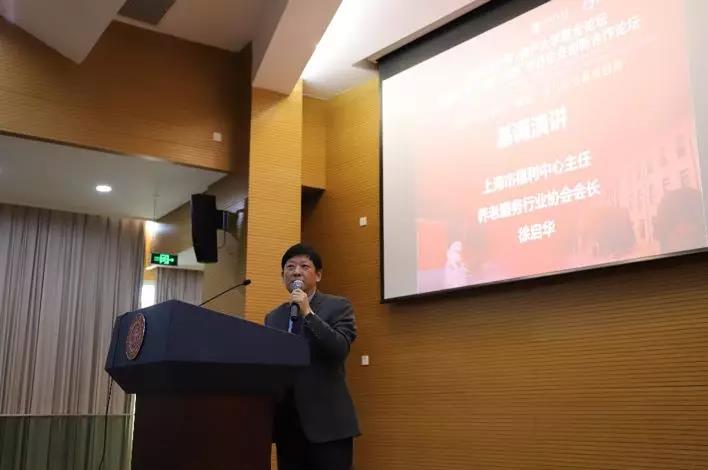
Speech by Xu Qihua, Director of Shanghai Welfare Center and President of the Elderly Care Industry Association
Gu and Jiupeng, professors of health research at Kobe University Graduate School, introduced the theoretical basis of cognitive disease prevention, elaborated and analyzed the international and Japanese epidemiological studies on cognitive disease prevention. He pointed out that providing clear factual evidence and obtaining policy support are the key measures to establish a cognitive disease prevention system.
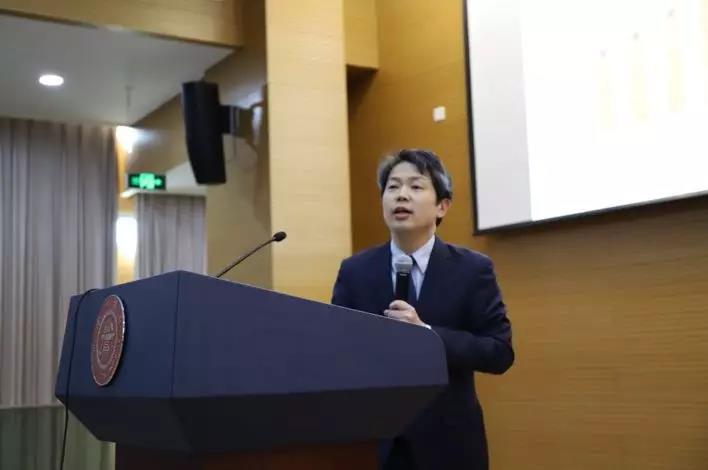
Lecture by Gu He Jiupeng, a professor of health research at Kobe University Graduate School
Zhang Xiaoyi, professor of the School of International and Public Affairs of Shanghai Jiao Tong University and director of the Institute of Long term Care for the Elderly, introduced the social participation of the elderly in the context of active aging from the perspective of China Japan comparison. She pointed out that there are about 250 million elderly people in China, 200 million of whom are active, and the remaining 50 million have disability and dementia. She put forward the concept of active aging, encouraged the elderly to participate in social activities, and introduced that Japan promoted the elderly to participate in society by ensuring various forms of employment opportunities, ensuring fair employment treatment, expanding employment channels, actively supporting entrepreneurship and other means. She believes that although the aging degree of the population in China and Japan is different, the elderly in both countries have different perceptions of social participation, and the main ways of social participation are also different, Japan's promotion measures for the elderly to participate in society can still give some inspiration for China's future development.
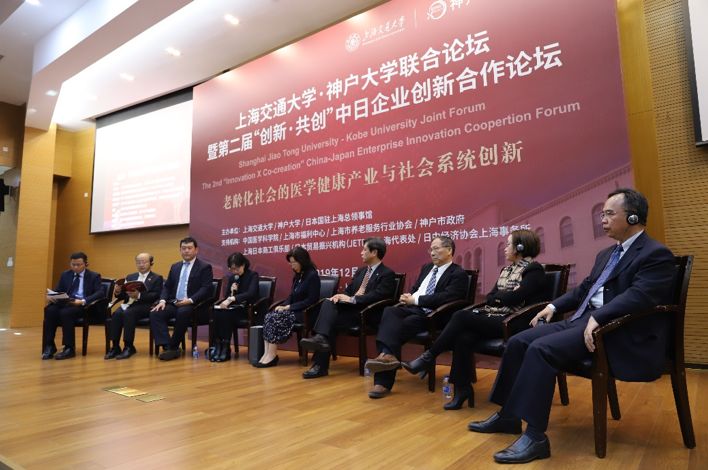
Guan Genyuji, Director of the Comprehensive Center for International Education, an international cooperation promotion institution of Kobe University, and Professor of the Graduate School of Law Research, expressed his views
Zhu Mang, director of the Medical Affairs Law Research Center of Shanghai Jiao Tong University, pointed out that at this stage, the social response to aging is concentrated in medical treatment, care and other areas targeting the aging of the elderly, which is relatively negative. The implementation of measures is also difficult due to the conflict of interests of all parties. It should be taken into account that although the elderly are physically weak, their intelligence and experience are often more mature, It may play a new role in the new era when the industrial society is transformed into the Internet society. Yang Jinyu, a visiting professor at Southern Medical University and vice president of the Japanese Intermediate Nursing Society, believes that the social response logic to aging should include three dimensions: support, medical care and care. He compares the response logic of aging in China and Japan, and believes that Japan mainly relies on social policies and welfare thinking, while China mainly relies on administrative leadership and welfare thinking. He pointed out that China should learn from Japan's experience in elderly care and social welfare policy evaluation. Gong Weijuan, a professor and vice dean of Yangzhou University School of Medicine and dean of the School of Nursing, first analyzed the current situation of the shortage of nursing staff in China and the popularity of family support for the elderly, and believed that remote nursing was more suitable for this situation. To this end, she introduced the Japanese Salus care system and analyzed its advantages and disadvantages. Li Qiang, Deputy Director of Shanghai Minhang District Medical Security Bureau, first analyzed the current situation of aging in Shanghai, and pointed out that the elderly care should follow the concept of home based, community based, institution supplemented, and combination of medical care and elderly care. He believes that there are structural problems of supply and demand contradiction in China's elderly care at this stage, and the level of professionalism of nursing services needs to be improved and policies need to be improved. To solve these problems, we should improve the long-term care insurance system and promote the development of smart and healthy elderly care industry.
In the afternoon, the first half of the forum was themed "China Japan Health Industry Cooperation", and Huang Phosphorus, deputy director of the Asian Comprehensive Academic Center, an international cooperation promotion institution of Kobe University, and professor of the Department of Business Studies of the Graduate School of Kobe University, served as the host. Chen Jiangping, director of the Student Innovation Center of Shanghai Jiaotong University, Zhang Ziwei, CEO of Shouci Health Care Group, Zhang Huagang, a representative entrepreneur of the elderly care real estate industry and CEO of Zendai Real Estate Co., Ltd., Gong Li Qihui, founder of Hengkuan Capital, and Aoki Xinxing, deputy business director of the medical affairs department of Nippon Electric Co., Ltd, Kexing Tanaka, Vice President of Life Sciences and Healthcare Business Department of Deloitte Financial Consulting, expressed his views and held a heated discussion around the "cross-border cooperation between China and Japan's health industry".
Chen Jiangping, director of the Student Innovation Center of Shanghai Jiaotong University, gave a brief introduction to the Student Innovation Center of Shanghai Jiaotong University, and proposed to cooperate with enterprises to promote the transformation of scientific research achievements into market products.
Zhang Ziwei, CEO of Shouci Health Care Group, pointed out that pension is the buyer's market. Providing the services most needed by the elderly, creating affordable prices for the elderly and creating the most comfortable environment for the elderly are the effective supply of pension. She believes that as a private enterprise, Shouci Health Pension Group should learn from Japan to shape the sense of professionalism of elderly care practitioners, promote the refined management and control of operations and personnel training.
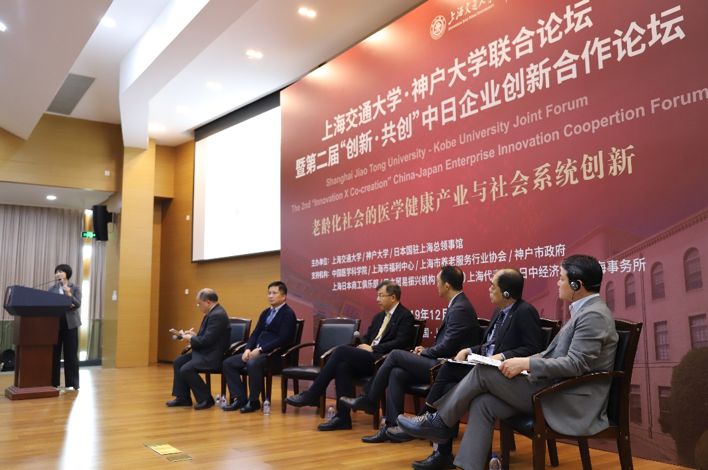
Zhang Ziwei, CEO of Shouci Health Care Group, expressed his opinion
Zhang Huagang, CEO of Zendai Real Estate Co., Ltd., pointed out that China's elderly care industry is still in its infancy, the concept of elderly care is relatively primitive, and the demand for elderly care is also in its infancy. There is a mismatch between demand and supply, and there is an urgent need to provide valuable products and design a service system based on customer demand. He hoped that China's elderly care business could cooperate with Japan in consulting, operation, capital and other aspects, and learn from and introduce Japan's advanced intelligent equipment, diagnosis, diagnosis and treatment technology, equipment and elderly care management system.
Gong Li Qihui, founder of Hengkuan Capital, pointed out that the application of artificial intelligence and big data, the expansion of virtual diagnosis, the maximization of customer experience, the compression of costs, the enhancement of value and the challenges of safety are the main challenges facing the development of the health industry at this stage. The health industry should raise its goal from eating well and living well to the level of spiritual satisfaction. In terms of China Japan interaction, he believed that the Japanese Industrial Investment Fund was a bridge to achieve China Japan interaction.
Aoki Shinkai, deputy business director of the medical business department of Nitto Electric Co., Ltd., pointed out that in the field of health care, efforts should be made to improve medical quality, control medical expenses, achieve universal medical care, integrate the Internet of Things with life sciences, promote the progress of prevention and diagnosis, the development of hospitals and the pharmaceutical industry, and the popularization of self medication.
Kexing Tanaka, Vice President of Life Science and Healthcare Business Department of Deloitte Financial Consulting, pointed out that the development of the elderly care industry should focus on financial burden, prevention and health care, talent shortage and other issues. He showed the memorandum signed by the National Health Commission of China and the Ministry of Health, Welfare and Labor of Japan, looking forward to further cooperation and common progress between China and Japan.
Later, the forum entered the second half of the "Sino Japanese Business Innovation Marathon", which was hosted by Takan Fukuda, Consul of the Japanese Consulate General in Shanghai. The "Creativity Marathon" is a special event of this forum. It is a brainstorming event combining "creativity" and "marathon". The event was jointly held by the Japanese Consulate General in Shanghai of the sponsor, Shanghai Jiaotong University and the Sino Japanese innovation and entrepreneurship accelerator "Jiangxin" of the partner. The activity is in the form of a group, focusing on the designated topic, through the collection of information and discussion, to arrive at a solution to the topic within 24 hours. The creative marathon activity consisted of 6 groups of 12 young entrepreneurs from China and Japan from the health and nursing industries. The participants from China and Japan who had never met one day in advance began to discuss and come up with solutions as soon as they met, and then published them on the forum. The theme of this "Creative Marathon" is "New Business Model of Elderly Care Business". Six groups discussed respectively around stroke care, new era high-tech door-to-door care, cognitive care, nursing threshold, artificial intelligence nutritionists and nursing warmth, and put forward corresponding business plans. Six guests in the first half of the speech session commented and scored, And finally decided to take the group of "nursing warmth" as the winning group.
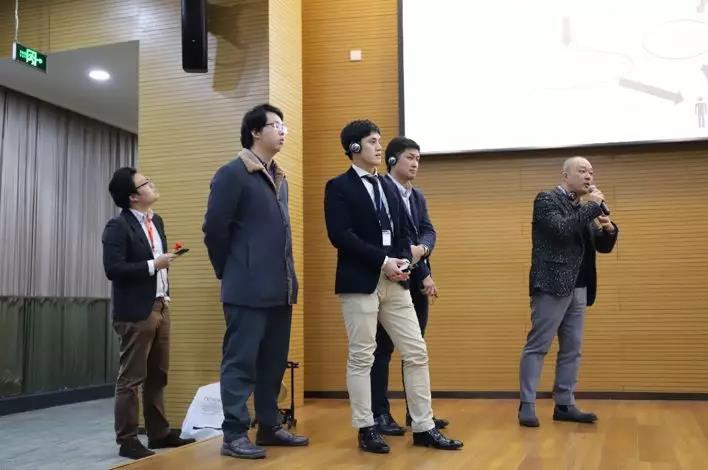
The group of "Sino Japanese Business Innovation Marathon" presented
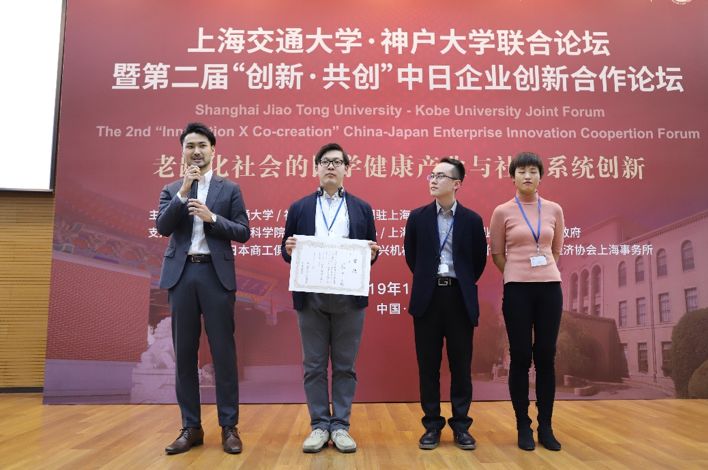
The winning group expressed their feelings
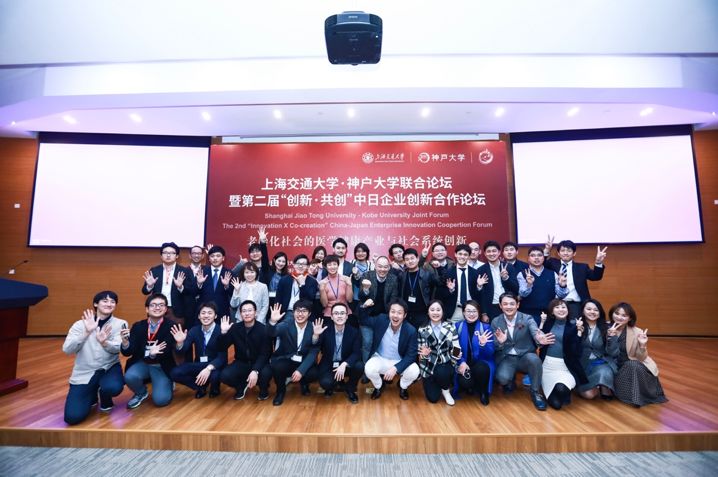
Group photo of "Sino Japanese Business Innovation Marathon"
The closing ceremony of the forum was presided over by Lv Shoujun, a professor of the School of International and Public Affairs of Shanghai Jiao Tong University. Fukuda Takan, a consul of the Japanese Consulate General in Shanghai, and Ji Weidong, director of the Japan Research Center of Shanghai Jiao Tong University, delivered closing speeches respectively. Finally, the Shanghai Jiaotong University Kobe University Joint Forum and the second "Innovation and Co creation" Sino Japanese Enterprise Innovation Cooperation Forum came to a successful conclusion with applause.
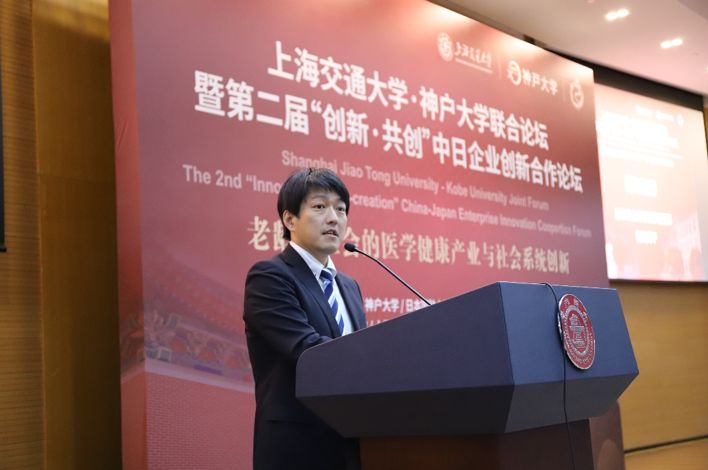
Consul of the Consulate General of Japan in Shanghai Fukuda Gaogan delivered a closing speech